After the worst of the tragedy seemed over, the pain was no less acute for the victims and their relatives. It was the beginning for them. The victims were survivors, but very few felt "lucky" for being so.
They sat burned and bruised, physically battered and mentally overwhelmed. Just a day after the crash, some survivors were coming to terms with the events of their narrow escape. And the realization of how close they had come to death settled deeper upon them.
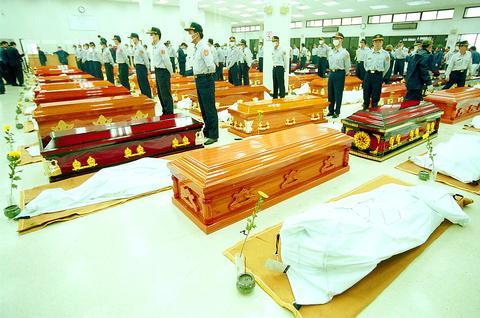
PHOTO: CHIANG YING-YING, TAIPEI TIMES
SURVIVOR: Mike Yu
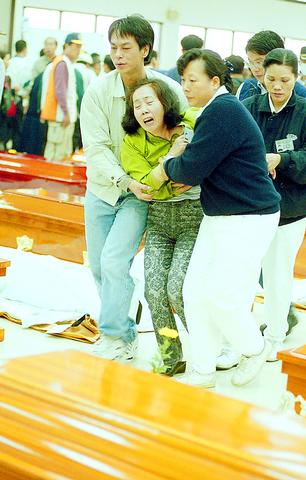
PHOTO: CHIANG YING-YING, TAIPEI TIMES
"I can only use the word grievous to describe what I saw," said Mike Yu (
Yu was lucky. He escaped with only light burns on his feet and hands, and he was soon transferred out of the Burn Center at Chang Gung Memorial Hospital (長庚紀念醫院) in Linkou (林口). But his mental burden is heavy. "I really wanted to help other passengers if I could," he said.
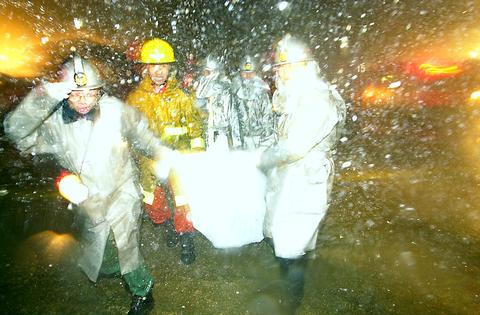
PHOTO: GEORGE TSORNG, TAIPEI TIMES
When Singapore Airlines flight SQ006 burst into flame Tuesday night, there were 179 people on board. Seventy-nine died instantly. Two more died later in the hospital. The cause of the crash is still under investigation.
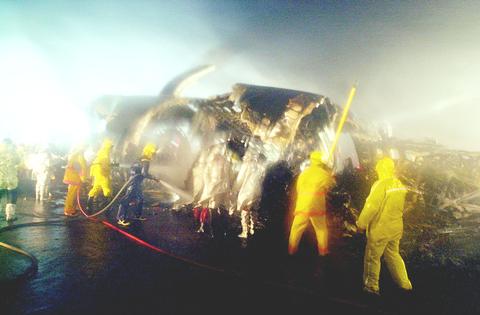
PHOTO: GEORGE TSORNG, TAIPEI TIMES
During the two days in the hospital, Yu refrained from watching TV or reading any news related to the airplane crash. "I used to be a couch potato. I loved to watch TV, you know. But now I don't want to," he said. "I don't want to think of the recurrences of the tragedy."
The 46 year-old Yu, an executive in an automobile company, has had time to deeply reflect on his life over the past few days. "I have done so little for society in the past," he said. "In the future, I will try as hard as I can to benefit others."
SURVIVOR: Wei Chih-an
"Hey, how do you like my Halloween outfit?" said Wei Chih-an (魏祈安). Bandages covered his face and hands. He was greeting a friend visiting him in the Burn Center at Chang Gong Hospital and trying too bring a little levity to what was clearly a bleak time.
"I was probably among the first 20 passengers running out of the plane," he recalled. "I felt a tremor, something similar to that when the wheels of a plane hit the ground during landing." He felt this tremor twice. And then the next thing he saw was the sky, up above, raining and windy. He was still in his seat.
"Run! Quickly! Run!" he heard someone say. "I immediately got out of my seat and began running. After running for about 20, 30 meters, I thought it was far enough and I slowed down to walking."
"Keep running, the plane may explode!" he heard from a flight attendant. So he ran again, with a dozen passengers ahead or behind him. They crossed the trench separating runways and moved onto the tarmac again.
The running was quiet, compared to the very first moments of the crash, when people screaming, yelling, families calling each other's names. "No one was talking. I had not a second to think of anything. I just kept running," Wei said.
Wei is a US citizen from Taiwan. He runs a small store in Los Angeles with his wife. Last week, Wei came back to Taipei to see his 70-year-old father. The accident has prolonged his stay in Taipei. Because 5 percent of his body is covered with first-degree burns -- he didn't realize he was wounded until he reached the tarmac -- he will stay for another month. "But I am very glad I survived, which is the most important thing for now.
"Absolutely," says a nearby friend, nodding and patting his shoulder.
Asked if he would fear flying in the future, the 51-year-old responded in a practical tone: "I cannot have this fear. I still need to go home to Los Angeles."
SURVIVORS: Father Cheng Wen-teh, sons Cheng Tze-heng and Cheng Tze-hsien
"I asked their daddy to take the kids abroad to get a better education. ... Who could know things would turn out this way?" said Lee Chih-chen (李琦珍), sobbing.
She is the mother of seven-year-old Cheng Tze-heng (程子恆) and six-year-old Cheng Tze-hsien (程子賢) and the wife of Cheng Wen-teh (程文德), who was taking the boys to Belize so they could attend elementary school. The parents hoped their children would learn Spanish and English there.
"The airplane was so hot! So hot! Where is daddy?" cried Tze-hsien, when he and his brother were sent to the Burn Center.
Their father, by saving the two, suffered burns on nearly 40 percent of his body, including his chest, back, face and hands. He now has a tube down his throat to help him breathe and so is unable to speak.
"Daddy was trying to protect us with his body, and he also removed the crashed chair to help me get out of my seat," said Tze-hsien. The boy has his head and ears covered with bandages. His aunt said he had been shivering all day. "He said he's not going to fly anymore!" the aunt said.
The two boys have burns covering 5 to 8 percent of their bodies. When the family went to visit Cheng Wen-teh, the father, Cheng, although unable to speak, was clearly glad to see them and tried to get out of bed despite the seriousness of his injuries. "Don't move, Cheng Wen-teh! The kids and I already saw you. And we know you saw us, too! Stay still, ok? You'll worsen your wounds," Lee said.
Lee said she did not know what to do next. It will take at least a month for Cheng to recover while in hospital.
As for the kids, the plan to study abroad is sure to be put off. "I don't know if the brothers want to go abroad or not," she said.
COPING: Chang Gung Memorial Hospital
By 3pm on Wednesday, most of the victims brought to the Chang Gung Memorial Hospital (長庚紀念醫院) in Lin Kou (林口) had been cleared from the emergency room. All that remained was an information board giving the names and bed numbers of those who remained. An "unidentified foreigner" was listed and scrawled in black ink, on the same line, was the word "dead."
Most of the patients had been transferred to the hospital's Burns Center, on the second floor, where a line of volunteers from the Foguangshan Buddhist organization stood outside chanting prayers for victims, sending up an eerie base note in the antiseptic corridor.
Around 4pm, a covered gurney was wheeled out from behind the tightly closed steel door of the center, forcing a silence onto the few people lingering outside. A man in a dark suit and a fixed smile, an undertaker, took charge of the body. People in the corridor bowed their heads. A cream colored sheet with a tasseled fringe was laid over the stained sheets covering the body and it was wheeled away. The drone of the Buddhist chanting continued, emphasizing the somber moment.
Inside the burns unit, Steven Courtney, a biologist from the UK, noted that the accident could have been much worse. "When we arrived [from Bali], the plane was full. There would have been much more panic and it would have been difficult to escape. As it was, the plane was only one-third full [when we left.]"
Seated to the rear of the plane, Courtney recalls a fireball rushing towards him, then pushing himself forward to the central area, where he escaped through a great break in the fuselage of the plane.
Courtney had second and third degree burns covering 20 percent of his body, mostly on his back and thighs. Confined to his bed, Courtney fretted over the lack of mobile phones, which are banned because they might interfere with the hospital equipment. He said he only wanted to keep in close contact with his wife, who was being put up at a hotel by Singapore Airlines. "I could be here for two weeks," he said. "All I really want to do is get home."

In 2020, a labor attache from the Philippines in Taipei sent a letter to the Ministry of Foreign Affairs demanding that a Filipina worker accused of “cyber-libel” against then-president Rodrigo Duterte be deported. A press release from the Philippines office from the attache accused the woman of “using several social media accounts” to “discredit and malign the President and destabilize the government.” The attache also claimed that the woman had broken Taiwan’s laws. The government responded that she had broken no laws, and that all foreign workers were treated the same as Taiwan citizens and that “their rights are protected,
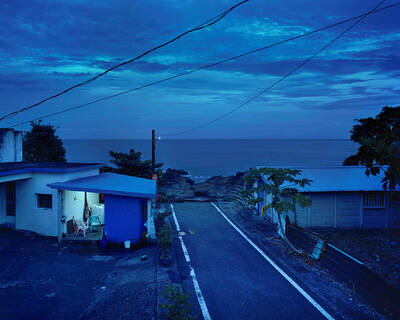
A white horse stark against a black beach. A family pushes a car through floodwaters in Chiayi County. People play on a beach in Pingtung County, as a nuclear power plant looms in the background. These are just some of the powerful images on display as part of Shen Chao-liang’s (沈昭良) Drifting (Overture) exhibition, currently on display at AKI Gallery in Taipei. For the first time in Shen’s decorated career, his photography seeks to speak to broader, multi-layered issues within the fabric of Taiwanese society. The photographs look towards history, national identity, ecological changes and more to create a collection of images
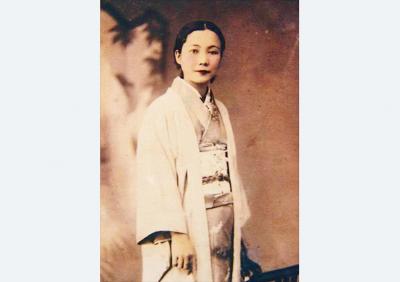
March 16 to March 22 In just a year, Liu Ching-hsiang (劉清香) went from Taiwanese opera performer to arguably Taiwan’s first pop superstar, pumping out hits that captivated the Japanese colony under the moniker Chun-chun (純純). Last week’s Taiwan in Time explored how the Hoklo (commonly known as Taiwanese) theme song for the Chinese silent movie The Peach Girl (桃花泣血記) unexpectedly became the first smash hit after the film’s Taipei premiere in March 1932, in part due to aggressive promotion on the streets. Seeing an opportunity, Columbia Records’ (affiliated with the US entity) Taiwan director Shojiro Kashino asked Liu, who had

A series of dramatic news items dropped last month that shed light on Chinese Communist Party (CCP) attitudes towards three candidates for last year’s presidential election: Taiwan People’s Party (TPP) founder Ko Wen-je (柯文哲), Terry Gou (郭台銘), founder of Hon Hai Precision Industry Co (鴻海精密), also known as Foxconn Technology Group (富士康科技集團), and New Taipei City Mayor Hou You-yi (侯友宜) of the Chinese Nationalist Party (KMT). It also revealed deep blue support for Ko and Gou from inside the KMT, how they interacted with the CCP and alleged election interference involving NT$100 million (US$3.05 million) or more raised by the